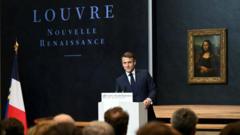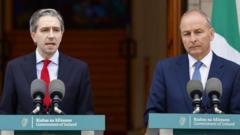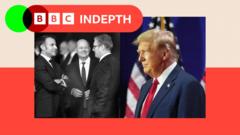As President Macron appoints François Bayrou to lead the French government, the political landscape remains in disarray due to a legislative impasse. While Bayrou's experience and cross-party relationships may offer hope, challenges loom that could thwart effective governance.
Can François Bayrou Navigate France’s Political Quagmire?

Can François Bayrou Navigate France’s Political Quagmire?
With François Bayrou stepping in as France's new Prime Minister, questions arise about his ability to overcome political deadlocks and rebuild a functioning government.
In the wake of intense political turmoil in France, President Emmanuel Macron has turned to veteran politician François Bayrou to help guide the nation through its current governance crisis. Bayrou, a seasoned centrist figure with decades of political experience, is well-respected across various factions of the French political landscape. However, the mounting challenges he faces mean that predictions of a successful tenure may be premature.
The political climate of the National Assembly has remained stagnant since July, comprising three opposing blocs that resist coalition-building. Given that the next opportunity to alter this situation won't arise until July 2025, any efforts by Bayrou to facilitate government functioning may be futile.
Following the ousting of former Prime Minister Michel Barnier via a no-confidence vote—largely supported by leftist and populist factions—Macron has engaged in consultations to foster a fresh, informal coalition. Initially seeking alignment with the Socialist Party (PS), Macron's attempts foundered on their demand for policies he was unwilling to adopt, forcing him to recruit from his inner circle.
Having supported Macron's initial presidential campaign in 2017, Bayrou stands at a significant crossroads. With a heritage in the centrist tradition, he has led the Democratic Movement (Modem) since its establishment in 2007, holding local political power as mayor of Pau since 2014. Known for his commitment to decentralization, his background also includes a brief tenure as Minister of Education in the 1990s and an even shorter stint as Justice Minister in 2017, during which he faced allegations in a funding scandal—claims he ultimately overcame.
At the age of 73, Bayrou’s long political journey includes three presidential bids, with his best performance in 2007 when he garnered nearly 19% of the vote. This historical context primes him for the delicate task ahead: bridging the divides between left and right to ensure the survival of a minority government. His well-established relationships with various parties, including the Socialists and even the populist right led by Marine Le Pen, mark him as a figure who could navigate this swamp. However, Le Pen's allies have made it clear that they would oppose a government that mirrors Barnier's administration.
Political commentators note that Bayrou's independent streak may provide him with the necessary leverage to create policy that leans more leftward, diverging from Macron's overall direction. This shift comes at a pivotal moment where the government’s authority has been significantly diluted, bringing power back to the parliament reminiscent of France’s Fourth Republic.
As Bayrou prepares to announce his cabinet—a move likely to signal his intention to collaborate across party lines—his foremost immediate challenge is devising a new budget for 2025. With increasing pressure to cut national debt, he must also navigate potential rebellions from the left and far-right factions while contemplating a controversial non-aggression pact aimed at restricting legislative motions and motions of censure.
As the bells of Notre-Dame ring out tonight, marking a moment of reflection, it remains to be seen if François Bayrou's leadership will lead France out of its political labyrinth or deepen its crisis further.






















